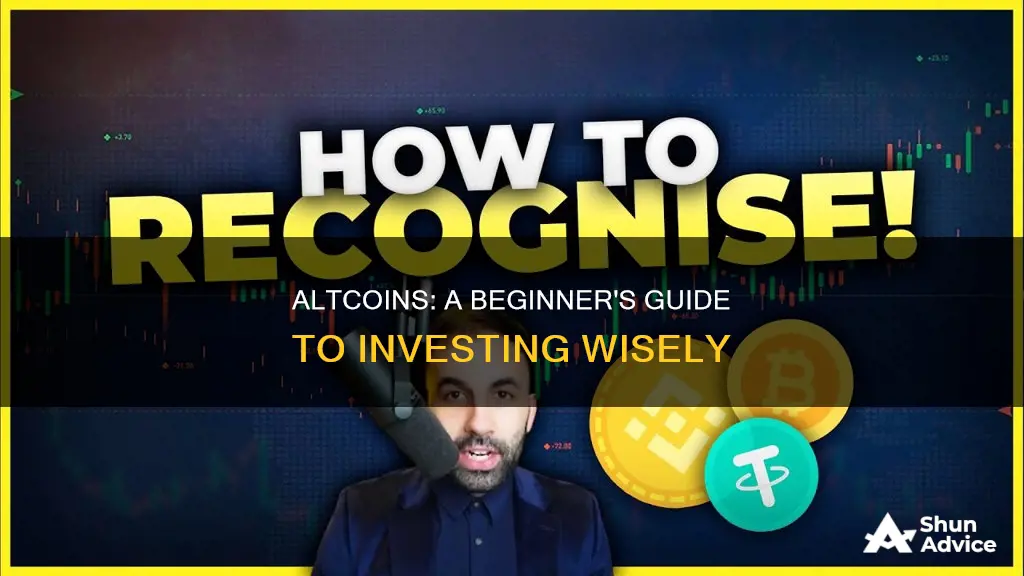
Investing in altcoins can be a risky but potentially rewarding endeavour. Altcoins are any cryptocurrencies other than Bitcoin, and there are thousands to choose from.
Before investing, it's important to research the crypto projects you're considering. This includes visiting the project website, reading the white paper, and seeking additional information. Once you've found altcoins that fit your investment goals, the next step is to choose a crypto exchange, open an account, and deposit funds for trading.
There are several ways to buy altcoins, including through cryptocurrency exchanges, CFD brokers, P2P marketplaces, or in-person trading. Each method has its own advantages and disadvantages, so it's important to choose the one that best suits your needs.
When buying altcoins, it's crucial to consider factors such as deposit fees, trading fees, and the volatility of the cryptocurrency market. It's also important to use a regulated platform to minimize security and safety risks.
Additionally, consider your investment strategy. Are you planning to hold your altcoins for the long term or sell them within a year? Each approach has its own tax implications and risks.
Overall, investing in altcoins can be a lucrative opportunity, but it's important to approach it with caution and conduct thorough research.
| Characteristics | Values |
|---|---|
| Definition | Any cryptocurrency other than Bitcoin |
| Examples | Litecoin (LTC), Uniswap (UNI), Dogecoin (DOGE), Zcash (ZEC), Cardano (ADA), Solana, Ripple, Ethereum, NEO, Internet Computer (ICP), Bonk, Floki, Shiba Inu, Pepe |
| Pros | High potential returns, large selection |
| Cons | High levels of risk, difficult to purchase |
| Types | Native cryptocurrencies, tokens, stablecoins, forks |
| How to buy | Cryptocurrency exchanges, CFD brokers, P2P marketplaces, in-person trading |
| How to pay | PayPal, bank transfer, digital tokens, credit/debit card |
| How to store | Exchange wallet, hot wallet, cold wallet, hardware wallet |
What You'll Learn

How to choose an altcoin
With thousands of altcoins available, choosing the right one for you can be challenging. Here are some factors to consider when selecting an altcoin to invest in:
- Reputation and Risk: Altcoins are generally riskier than traditional cryptocurrencies like Bitcoin and Ethereum. Some altcoins are scams or rug pulls, so it's important to research the project and its team thoroughly. Look for established coins with a good reputation and a long track record, such as Ethereum, Polkadot, Cardano, and Polygon.
- Use Cases and Utility: Consider the use cases and utility of the altcoin. Does it solve a real-world problem or offer any advantages over other cryptocurrencies? For example, Ethereum's smart contracts can replace intermediaries in insurance, banking, and management.
- Liquidity and Trading Volume: Ensure the altcoin has sufficient liquidity and trading volume. Low liquidity can affect slippage, transaction fees, and your ability to sell the coin later on.
- Price, Market Cap, and Trading Volume: Consider the price, market cap, and 24-hour trading volume of the altcoin. While this doesn't guarantee future performance, it can indicate the level of investor interest.
- Community and Social Sentiment: Analyze the community and social sentiment around the altcoin. Are there active discussions on platforms like Discord, Telegram, and Twitter? What is the overall sentiment towards the project?
- Wallet Compatibility: Ensure the altcoin is compatible with your cryptocurrency wallet. Different wallets support different blockchains and token standards. For example, an Ethereum wallet will support the Ethereum token standard.
- Exchange Availability: Check if the altcoin is available on reputable cryptocurrency exchanges like Coinbase, Binance, Kraken, or Crypto.com. This will make it easier to purchase and trade the altcoin.
- Regulation and Compliance: Research the regulatory landscape surrounding the altcoin. Are there any legal battles or government regulations that could impact its future?
- Whitepaper and Technical Documentation: Read the project's whitepaper and technical documentation to understand its goals, technology, and use cases better.
- Team and Development: Look into the team behind the altcoin. Are they experienced and reputable? What is their track record in the cryptocurrency space?
Remember to diversify your portfolio and never invest more than you can afford to lose. Conduct thorough due diligence and consider seeking advice from a financial professional before investing in altcoins.
Bitcoin Mining Stocks: Worth the Investment Risk?
You may want to see also

How to buy altcoins with USD
Step 1: Understand the market and your risk appetite
Before investing in altcoins, it's important to understand the market and your risk appetite. Altcoins are risky assets, and it's crucial to determine the percentage of your crypto portfolio you want to dedicate to them. Keep in mind that 92% of blockchain projects have failed, so a well-diversified portfolio is essential.
Step 2: Research and choose an altcoin
The next step is to research and select an altcoin that aligns with your investment goals. Consider factors such as community and adoption, use cases, liquidity, tokenomics, and the development team.
Step 3: Choose an exchange
You'll need to choose a crypto exchange that allows you to trade USD for altcoins, such as Kraken, or purchase Bitcoin or Ethereum on a platform like Coinbase and then trade it for altcoins on another exchange like Bittrex.
Step 4: Fund your account
After choosing an exchange, you'll need to fund your account. This can be done through a wire transfer or an automated clearing house (ACH) transfer. Some platforms, like Robinhood and Webull, offer instant access to buying power, allowing you to start trading before the transfer is cleared.
Step 5: Study the market and buy
Take some time to study the altcoin market before investing a large amount. Start with small purchases to get a feel for the market and learn valuable lessons with minimal risk. Once you're ready, search for the desired altcoin on the exchange, enter the amount you want to purchase, and execute the trade.
Step 6: Store your altcoins securely
Finally, consider storing your altcoins in a cryptocurrency wallet to have full discretion over your tokens. Hardware wallets, like the Ledger Nano S Plus, are physical devices that store the private keys to your crypto wallet, offering the highest level of security. Software wallets, like the Coinbase Wallet, are also an option and provide more convenience and flexibility.
The Beginner's Guide to Investing in Dogecoin
You may want to see also

How to store altcoins
There are several options for storing altcoins, each with its own advantages and disadvantages. Here is a detailed guide on how to store your altcoins securely:
Desktop Wallets
Desktop wallets are a convenient option if you want to store your altcoins on your computer. Coinbase is one of the most popular and recommended platforms for desktop storage. It offers a simple and user-friendly interface, allowing you to create an account, buy altcoins directly on the exchange, or transfer existing tokens. Coinbase also provides enhanced security features, such as 2FA verification, to protect your coins from hackers. However, it is important to note that desktop wallets are considered "hot wallets," which are connected to the internet and may be more vulnerable to online security threats.
Mobile App Wallets
Mobile app wallets, such as Coinbase and Cool Wallet, provide easy access to your altcoins on the go. These apps allow you to buy, sell, and transfer your cryptocurrencies with just a few taps on your smartphone. Cool Wallet, for example, connects to your smartphone via Bluetooth and offers enhanced security features like facial ID or fingerprint recognition. While mobile app wallets offer convenience, they may sacrifice some security measures compared to other options.
Hardware Wallets (Cold/Offline Storage)
Hardware wallets, also known as cold or offline storage, are considered the absolute best way to store your altcoins securely. Once you transfer your coins to this wallet and unplug the device, your coins are completely offline and safe from remote hacking attempts. Examples of popular hardware wallets include Ledger, Trezor, and Ellipal. These wallets are USB-like devices that store your private keys, making it difficult for hackers to access your funds without physical access to the device. However, hardware wallets may be less convenient for those who want quick access to their altcoins.
Exchange Wallets
Exchange wallets, such as Coinbase, offer a secure way to store your altcoins on an exchange platform. Coinbase, in particular, is known for its robust security features, including regulation and licensing, digital asset storage, and keeping the majority of digital assets in offline cold storage. While exchange wallets provide a safe option, it is important to research the security measures and reputation of the specific exchange you choose.
Paper Wallets
Paper wallets are another form of cold storage, where your private keys are printed out and stored offline. This method ensures that your altcoins are completely offline and safe from digital threats. However, paper wallets require careful handling and storage to prevent physical damage or loss.
In conclusion, when deciding how to store your altcoins, consider factors such as security, convenience, and accessibility. Hardware wallets offer the highest level of security, while mobile and desktop wallets provide easier access to your coins. Always research the safety features, reputation, and user reviews of the storage method you choose to ensure the protection of your altcoins.
Bitcoin or XTP: Where Should You Invest Your Money?
You may want to see also

How to sell altcoins
Selling altcoins is a straightforward process that can be done on most altcoin-buying platforms. Here is a step-by-step guide on how to sell altcoins:
- Log in to the exchange platform.
- Select the cryptocurrency you want to sell in the "Markets" tab.
- Enter the number of tokens you wish to sell and the desired price.
- Check the details and then click the "Sell" button.
If you moved your altcoins to a self-custody wallet, you will need to send them back to the exchange to trade on the platform. You can usually find the exchange wallet address in the "deposit" section of the site or app.
It is important to choose the correct address for the specific altcoin you are selling. Sending crypto to the incorrect wallet address will result in lost funds.
Depending on the network you use, the funds should be available in your trading account within a few minutes. Exchanges typically wait for a specific number of confirmations from the network before making the funds available for trading.
Once the funds are available, you can use the advanced trading interface to set up your trade. Here are the steps to follow:
- Find your altcoin's trading pair.
- Set up your chart if desired.
- Choose the sell tab instead of the buy tab.
- Select a market or limit order.
- Enter the trade details.
If your trading pair was DOGE/USDT, for example, you will have USDT in your account after the trade executes. Follow the exchange's directions if you need to withdraw. Alternatively, you might want to buy a different altcoin, following the same process.
It is worth noting that the process of selling altcoins is very similar to buying them. Therefore, it is essential to understand the buying process to navigate the selling process effectively.
Additionally, it is crucial to consider the risks associated with investing in altcoins. While they offer high potential returns, especially if you invest early, they also carry significant risks. Many altcoins have historically been scams, and they can be challenging to purchase due to their availability on specific crypto exchanges.
When selling altcoins, it is also essential to consider the fees charged by the platform. Most platforms will charge a small seller's fee, so it is important to factor this into your decision-making process.
In conclusion, selling altcoins can be done on the same platforms where they were purchased. However, it is important to research the different methods available and choose the one that best suits your needs. Remember to always be security-conscious and aware of the potential risks when dealing with altcoins and crypto exchanges.
Coq Coin: A Smart Investment Decision?
You may want to see also

How to know if it's safe to invest in altcoins
Altcoins are risky investments, but there are ways to mitigate the risks. Here are some steps to help you determine if it's safe to invest in a particular altcoin:
- Research the altcoin thoroughly: Understand the purpose of the altcoin, the team behind it, and its unique features. Look into the official website, white paper, and community engagement.
- Check the volume and liquidity: Ensure that the altcoin has sufficient trading volume on reputable exchanges. Higher volume and liquidity can indicate a more active and stable market.
- Consider the wallet support: Verify that the altcoin is supported by reputable cryptocurrency wallets, such as hardware wallets (e.g., Trezor, Ledger) or software wallets that offer strong security features.
- Review the project's track record: Assess the longevity and stability of the project. Be cautious of altcoins with a short track record or those that have exhibited signs of a "rug pull," where developers abandon the project after dumping their coins.
- Examine the market cap: Generally, altcoins with larger market capitalizations tend to be considered safer investments. However, this is not a hard-and-fast rule, and proper research is still essential.
- Understand the regulatory landscape: Recognize the regulatory environment surrounding altcoins and initial coin offerings (ICOs). While some fall under the jurisdiction of the U.S. Securities and Exchange Commission (SEC), many do not offer the same level of investor protection as regulated securities exchanges.
- Diversify your portfolio: Instead of investing a large sum in a single altcoin, consider diversifying your investments across multiple altcoins to spread out the risk.
- Only invest what you can afford to lose: Recognize that altcoin investments are highly speculative, and there is a significant chance of losing your investment. Only invest money that you are comfortable losing, and ensure that your core financial needs are taken care of first.
- Due diligence on the team: Look into the team behind the altcoin. Are they transparent about their identities and qualifications? Do they have a track record of successful blockchain or cryptocurrency projects?
- Seek independent advice: Consider consulting a financial advisor or crypto expert who is familiar with the altcoin market. They can provide personalized guidance based on your risk tolerance and investment goals.
Remember, investing in altcoins is inherently risky, and there are no guarantees of profits. Always approach altcoin investments with caution and conduct extensive research before committing your funds.
Where to Invest: Bitcoin or Tesla?
You may want to see also
Frequently asked questions
Altcoins are any cryptocurrencies that are not Bitcoin. There are thousands of altcoins, most of which can be categorised as stablecoins, utility tokens, governance tokens, or meme coins.
You can buy altcoins through a crypto exchange, CFD broker, P2P marketplace, or in-person. You will need to create and verify an account, deposit funds, and then search for and buy the altcoin you require.
Altcoins are riskier than traditional cryptocurrencies like Bitcoin and Ether. Many altcoins are scams, and the majority of altcoins have failed since 2014.







